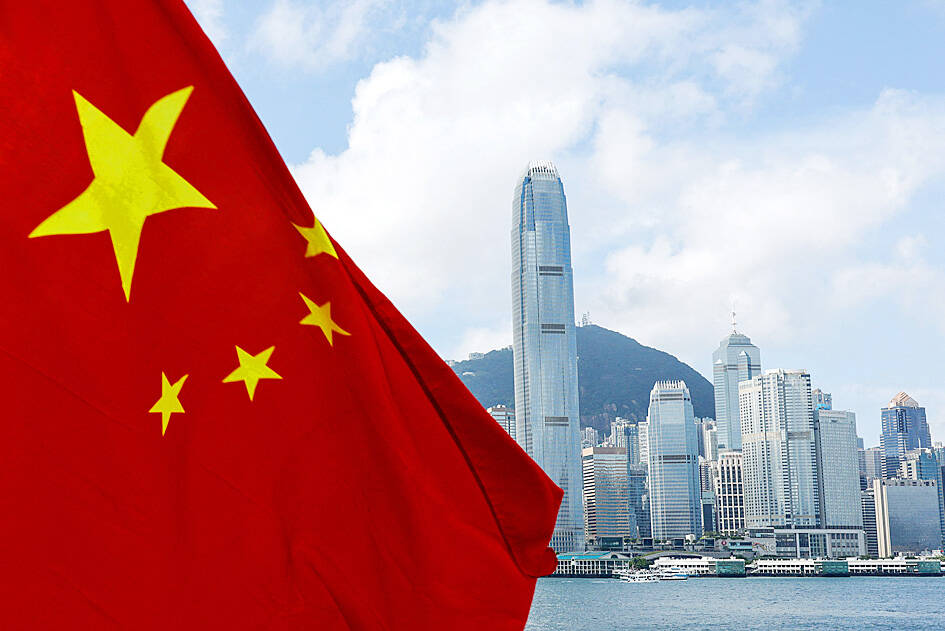China’s Office of the Commissioner of the Ministry of Foreign Affairs in Hong Kong has asked foreign consulates in Hong Kong to submit details of their local staff, which is more proof that the “one country, two systems” model no longer exists, a Taiwanese academic said.
The office sent letters dated Monday last week to consulates in the territory, giving them one month to submit the information it requires.
The move followed Beijing’s attempt to obtain floor plans for all properties used by foreign missions in Hong Kong last year, which raised concerns among diplomats that the information could be used for espionage or to install listening devices.

Photo: Reuters
The Hong Kong authorities said on the submission form that the information was being collected in accordance with the principle of proportionality and common international practices.
The personal data collected would be handed over to agents of the relevant bureaus, departments or agencies to manage local employees of the consulates, the note said.
The information required includes names, titles, dates of appointment, addresses, identification card or travel document numbers and nationalities of the employees.
The employees are also required to provide copies of their identification cards or travel documents.
The office on Wednesday last week said the request is in line with the Vienna Convention on Consular Relations and common international practice.
In Taipei, an official familiar with Hong Kong and Macau affairs said that it was “not surprising” that the foreign consulates would receive this kind of request from China, adding that it might be related to the widening of the Counter-Espionage Law in July.
The Taipei Economic and Cultural Office in Hong Kong of Taiwan’s Mainland Affairs Council did not receive such a request as it is “special” to Beijing, the official said.
National Cheng Kung University political science professor Hung Chin-fu (洪敬富) said that amending the Counter-Espionage Law, the Foreign Relations Law and the Patriotic Education Law to expand the scope of their applications to Hong Kong and Macau, as well as requesting information from foreign consulates showed that Beijing is suspecting Hong Kongers of working for hostile foreign forces.
Hong Kongers are perceived as actors who could threaten China’s interests or subvert the Chinese government, Hung said.
The move might have a chilling effect and make it more difficult for the West to have normal interaction with China, Hung added.
The vague definition of spies in the Counter-Espionage Law leaves those working in foreign consulates open to being charged falsely, he said.
Hong Kong citizens have no autonomy as they have to comply with Chinese laws under the so-called “one country, two systems” model, adopting the “New Era” ideology of Chinese President Xi Jinping (習近平), he said.
“The non-existence of the ‘one country, two systems’ model has been proven once again,” he said.

A relatively large earthquake may strike within the next two weeks, following a magnitude 5.2 temblor that shook Taitung County this morning, the Central Weather Administration (CWA) said. An earthquake struck at 8:18am today 10.2km west of Taitung County Hall in Taitung City at a relatively shallow depth of 6.5km, CWA data showed. The largest intensity of 4 was felt in Taitung and Pingtung counties, which received an alert notice, while areas north of Taichung did not feel any shaking, the CWA said. The earthquake was the result of the collision between the Philippine Plate and the Eurasian Plate, the agency said, adding

Snow fell in the mountainous areas of northern, central and eastern Taiwan in the early hours of yesterday, as cold air currents moved south. In the northern municipality of Taoyuan, snow started falling at about 6am in Fusing District (復興), district head Su Tso-hsi (蘇佐璽) said. By 10am, Lalashan National Forest Recreation Area, as well as Hualing (華陵), Sanguang (三光) and Gaoyi (高義) boroughs had seen snowfall, Su said. In central Taiwan, Shei-Pa National Park in Miaoli County and Hehuanshan National Forest Recreation Area in Nantou County saw snowfall of 5cm and 6cm respectively, by 10am, staff at the parks said. It began snowing

The 2025 Kaohsiung Wonderland–Winter Amusement Park event has teamed up with the Japanese manga series Chiikawa this year for its opening at Love River Bay yesterday, attracting more than 10,000 visitors, the city government said. Following the success of the “2024 Kaohsiung Wonderland” collaboration with a giant inflatable yellow duck installation designed by Dutch artist Florentijn Hofman, this year the Kaohsiung Tourism Bureau collaborated with Chiikawa by Japanese illustrator Nagano to present two giant inflatable characters. Two inflatable floats — the main character, Chiikwa, a white bear-like creature with round ears, and Hachiware, a white cat with a blue-tipped tail

HOLIDAY EXERCISE: National forest recreation areas from north to south offer travelers a wide choice of sights to connect with nature and enjoy its benefits Hiking is a good way to improve one’s health, the Forestry and Nature Conservation Agency said, as it released a list of national forest recreation areas that travelers can visit during the Lunar New Year holiday. Taking a green shower of phytoncides in the woods could boost one’s immunity system and metabolism, agency Director-General Lin Hwa-ching (林華慶) cited a Japanese study as saying. For people visiting northern Taiwan, Lin recommended the Dongyanshan National Forest Recreation Area in Taoyuan’s Fusing District (復興). Once an important plantation in the north, Dongyanshan (東眼山) has a number of historic monuments, he said. The area is broadly covered by